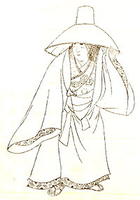
Izumi Shikibu (和 泉 式 部?) Was a Japanese waka poet who lived in the middle of the Heian era. He is a member of the Chūko Sanjūrokkasen (中古 三 十六 歌仙?) And the Nyōbō Sanjūrokkasen (女 房 三 十六 歌仙?). It was contemporary of Murasaki Shikibu and Akazome Emon. She was the daughter of Ōe no Masamune, governor of Echizen. His mother was the daughter of Taira no Yasuhira, governor of Etchu. At the age of 20 he married Tachibana no Michisada, who became governor of Izumi. Her name, as for women of the Heian era, is a compound of "Izumi" from the name of the province that her husband had in charge and the official designation of his father as a master of ceremony or shikibu (式 部?) . His daughter Koshikibu no Naishi was also a well-known poet. Izumi Shikibu accompanied Michisada in the province for a while, but got bored with the lifestyle and returned to the capital. He had a series of amorous events in the Court. At the beginning, before marrying Michisada, it was thought that she was in the company (some sources as wife) of a man named Omotomaru of the court of Empress Dowager Shoko. When she was married to Michisada, she fell in love with the third son of Emperor Reizei, Prince Tametaka and they had a public affair; resulting in a scandal in which she divorced her husband and was disinherited by her father. Later Prince Tametaka died in 1002 as a result of a plague, giving a mystical tinge to this scandal. Later he became acquainted with Prince Atsumichi, stepbrother of Prince Tametaka. The first year of their relationship was described in his semi-autobiographical novel Izumi Shikibu Nikki (和 泉 式 部 日記?). As in most newspapers of this time, the narration was made in third persons and with some fictional scenes. It is believed that Izumi's motive in writing this diary was to explain his love for certain courtiers. As with Prince Tametaka, their relationship was also secretly ceased and Prince Atsumichi's wife left her home in anger. Izumi moved to the residence of Prince Atsumichi and both had a public relationship until the prince's death in 1007 at the age of 27 years. In 1008, he attended the court of Fujiwara no Shoshi, daughter of Fujiwara no Michinaga and Empress Ichijō. Izumi Shikibu Nikki was written in this period, along with most of his important works compiled in the Izumi Shikibu Shū (和 泉 式 部 集?) And imperial anthologies. His life of love and passion earned him the nickname The Floating Lady (浮 か れ 女 ukarejo?) By Michinaga. In fact, his poetry is characterized by an overflowing passion and overwhelming feeling. Her style is totally opposite to that of Akazome Emon, even though both were in the same court and were close friends. In court he had increased rivaliad with Murasaki Shikibu, who had a similar poetic style. The emotional poetry of Izumi Shikibu won the admiration of many in the court, including Fujiwara no Kintō. While in court, he married Fujiwara no Yasumasa, a commander under Michinaga and famous for his bravery, and left the court to accompany him in the province of Tango. It is believed that he lived for a long time, but his year of death is unknown. The last imperial correspondence of it was in 1033.




